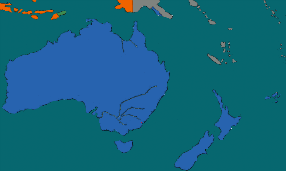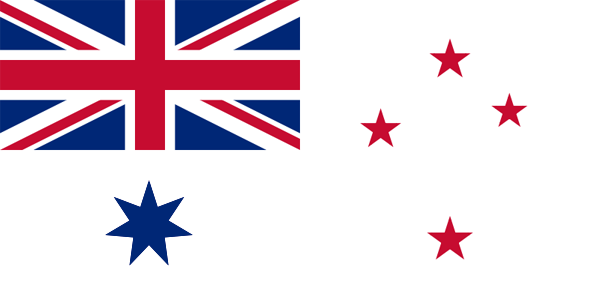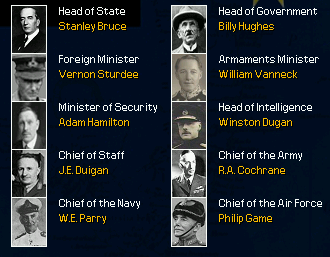Australasian Confederation
From Kaiserreich
| ||||
| Anthem God Save the King | ||||

| ||||
|
| ||||
| Official Language | English | |||
| Capital | Canberra | |||
| Head of State | George V, represented by Stanley Bruce | |||
| Head of Government | Billy Hughes | |||
| Establishment - Consolidation of Resources Act | December, 11 1924 | |||
| Government | Constitutional monarchy, dominion of the British Empire | |||
| Currency | Australasian Pound | |||
| Area | More than 8 millions of km² | |||
| Population | More than 8 millions | |||
The Australasian Confederation or Australasia is a country in Oceania. It consists of numerous islands in the Indian and Pacific Oceans. Neighbouring countries include the Dutch East Indies, the Portuguese colony of East Timor and the German colonial possessions in the Pacific Ocean (German New Guinea and Solomon islands).
Contents |
History
The Antipode Dominions saw a mixed performance in the Great War. Initial success occurred in 1914 with the capture of German New Guinea. While in 1915 – a humiliating defeat occurred in the Gallipoli Campaign and 11,000 ANZAC were consumed in the fiasco. Following Gallipoli, the Australasians saw success in the Sinai and Palestine campaign. Harry Chauvel, Commander of the ANZAC Mounted Corp, won subsequent victories at Beersheba and Jerusalem and the Ottoman’s loss of a dozen divisions resulted in irreplaceable losses. Chauvel’s gains were reversed – in 1918 – with the arrival of Ludendorff’s veterans from the Spring Offensive and Entente forces withdrew to entrenched positions in the Sinai, until a Peace with Honour was signed in 1921. To embarrassment, the Antipode Dominions were not recognized as distinct entities from Britain and the return of German New Guinea was met with outrage in the press. The Antipode Dominions proceeded unabated until the Victorian Police Strike of 1923 – which devolved into a Syndicalist revolt and the proclamation of a short-lived Melbourne Commune. Painstakingly - George VIII had enacted the Emergency Protocols, appointed Thomas Blamey as Minister of Security and the military – with assistance of demobilized paramilitaries, had violently put an end to the short lived revolt. In 1924 – the two Dominions were merged in the Consolidation of Resources Act. George VIII appointed Stanley Bruce as Governor General, elections and federal parliaments were suspended and a new Authoritarian-Democrat constitution was drafted to mitigate the occurrence of another revolt. In 1925 – the British Revolution led to a disruption in communication and a colonial seizure. David Murray Anderson, the commander of the China Station, had assumed control of the Oversea Fleet and enacted the ‘Anderson Protocol ‘ – mutinies were suppressed and colonial staff were evacuated to Australasia. Charles Vyner Brooke, the exiled White Rajah of Sarawak, is one notable evacuated colonial who has since resided in Sydney and is considered to be a popular socialite and humanitarian. The Australasian fleet and British oversea fleet were merged into a single Australasian station. A minor naval expansion was carried out in the 1920s and in 1932 a new Battleship and Fleet Carrier began construction and are expected to be commissioned during the 1936 Empire Day. While the military is in good shape, Stanley Bruce rules in stagnation and has done little to tackle the economic depression which has persisted in Australasia since the loss of Britain as an export market. Furthermore the influential Australasian Guard, formed in 1925, is increasingly becoming dissatisfied with Bruce and is calling for radical measures to tackle the depression and bring Revanchism to all who threaten the Antipodes.
Politics
|
Governor-General: Stanley Bruce (born 15 April 1883)
Prime Minister: Billy Hughes (born 25 September 1862)
Minister for External Affairs: Vernon Sturdee (born 24 March 1890)
Minister for Trade and Customs: William Vanneck (born 3 January 1883)
Attorney-General: Adam Hamilton (born 20 August 1880)
Director of the Joint Intelligence Bureau: Winston Dugan (born 3 September 1876)
Minister for Defence: J. E. Duigan
Chief of the General Staff: Ralph Alexander Cochrane (born 24 February 1895)
Chief of Staff of the Australasian Commonwealth Naval Board: William Edward Parry (born 1893)
Chief of the Air Staff: Philip Game (born 30 March 1876)
Under the appointed position of Governor-General, Stanley Bruce has been able to keep Australasia stable and secure for many years; however lately there has been a growing unrest and a rise of racism and there are many calling for a new Australasian regime.
Military
Army
The Australasian Army is large and well-organized and consist of several infantry divisions and a good number of cavarly division, together with a few garrisons to defend strategic positions such as Port Moresby and the island of Tasmania. Despite not being equipped with advanced weapons, the Australasian army in sometimes looked with envy by the Canadian Army, for it is larger, better organized and better led as several of the more progressive British generals settled in Australasia. For the future, the are plans for the inclusion of a few Marine divisions in the Australasian Army.
Air Force
The Australasian government concentrated its military investments in the army and the navy and therefore the Royal Australasian Air Force has been neglected. At the moment there is only a division of tactical bombers, but there are plans for an expansion of the air force and the construction of several naval bombers.
Navy
The Royal Australasian Navy comprise several ships from the Weltkrieg's era and a good transport force to send the troops where they are most needed. However, a modernization and expansion of the navy is in program for the near future.
Foreign relations
Alliance (also known as the Entente) with Canada, National France, Delhi and the Caribbean Federation.
Friendly relations with United States of America, Italian Federation, Spain and Russia
Unfriendly relations with Germany, Union of Britain, Japan, Bengal and Netherlands.
Culture
The exiled White Rajah Charles Vyner Brooke is a major figure in Sydney high society.


